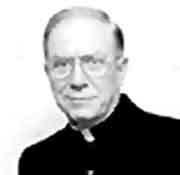 | Father Richard James Cleary was born and reared in Wichita. After graduation from Cathedral High School in 1947, he attended the seminary operated by the Benedictine monks of Conception Abbey in Northwestern Missouri. There he came to appreciate the life of the monks and, having obtained the permission of Bishop Mark Carroll of Wichita, he became a monk of that monastery. After being ordained a priest in 1955, his superiors sent him to get his master’s degree at the University of Ottawa, Canada, then to study in Athens, Greece, and then in Rome, Italy, where he obtained his doctor’s degree in Theology. Finally, he spent a year of study at Harvard University. Later, Fr. Cleary was assigned to teach for many years in Rome. In 1998, he returned to Wichita, where he served in parish ministry at St. Mary’s Cathedral and at Blessed Sacrament parishes. In 2001, his abbot (superior) transferred him to Arkansas, where he served as chaplain of the Benedictine Sisters of Holy Angels Convent in Jonesboro, and helped in the parishes of northeast Arkansas. In March 2010, he was re-assigned to his monastery, Conception Abbey, Conception, in Missouri 64433. He can be contacted there at, 660-944-2877, or by email: rjcleary@juno.com. |
Religion
2003-03-01 12:24:00
What happens when a person dies?
Question: What happens when a person dies? Is the process the same whether or not that person believed in Jesus Christ?
Answer: At death the soul, or principle of life, departs from the body. What happens to the body is evident according to the circumstances of the death of each individual person. Separated from the soul, the body commences to disintegrate and eventually returns to small particles of matter. What happens to the soul is not always evident, and here we are compelled to rely on religious faith. Through the centuries of recorded history, various religions have expressed a variety of opinions regarding the soul's fate after death. Most religions are agreed that the soul of a good and virtuous person enters into a state of unending happiness, while the soul of a malicious and evil person commences to suffer torments commensurate to the evil perpetrated during their life on earth. The virtues of equity and justice cry out for some such compensation after death: because in this life often it happens that good persons have to suffer much, while the wicked seem to prosper. So, what happens when a person dies? Immediately at death the individual soul passes to judgment in the sight of God, who is absolute Truth and absolute Justice. Then the soul makes the ultimate choice of his/her life. Those who have the habits of virtue easily choose God and companionship with his friends, the saints and holy angels. Those persons, who have formed evil habits, continue to choose badly; and their ultimate decision is to choose themselves in preference to God, thereby condemning themselves to an eternity of suffering in total frustration. Then they see clearly what they have lost through their own fault, what they could have had, but have deprived themselves of it: by stifling their conscience and ignoring the guidelines of true religion. Confer: the Gospel of John, chapter 5, verse 29. Jesus Christ, the Son of God, came on earth to teach and help sinful humans: how to live in a manner pleasing to God, and beneficial to their own ultimate interests. Belief in Jesus is a great help to achieving the salvation of one's soul. But Jesus does not force himself on anyone! If a person is ignorant of Jesus, but endeavors to live a virtuous life according to conscience and the natural law, implanted into his/her soul by the Creator, then s(he) can be saved and be happy after death. But if a person knows that Jesus is God's true prophet, and consciously rejects or ignores Jesus, then that person will be damned in the day of their judgment (cf. John 3:36).The old adage is generally true: as you live, so shall you die! But not always. Occasionally, a person, who has lived what appears to be a virtuous life, will turn foolish at the end and die in sin. Sometimes, a person, who has lived a sinful life, will experience a conversion on his/her deathbed, when they turn to God. Such a conversion is sufficient for salvation. But God alone can judge the ultimate destiny of the person who dies in a state of sin. We know that God is Just, and he is also Merciful. The Bible speaks of damnation and eternal punishment as certain realities. It is foolish to take-for-granted that every person will be saved. We must not presume on God's mercy, lest we be unprepared for that ultimate choice. In the gospels Jesus warns us to be prepared for death at any time. He states clearly that those who die, in a condition of alienation from God (which is sin), are excluded from heaven. But those who die in friendship with God: enter into such happiness that human eyes have not seen, nor can human tongues describe: what wonderful things God has prepared for those who love him.


